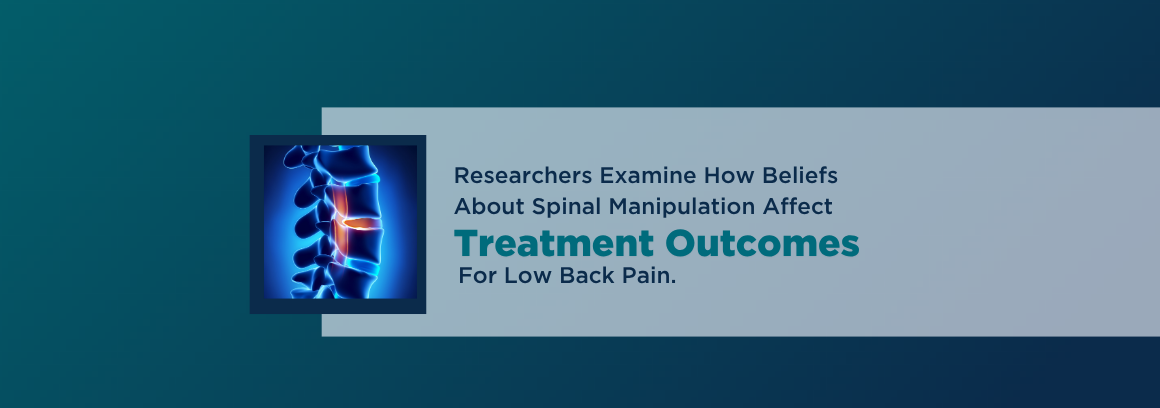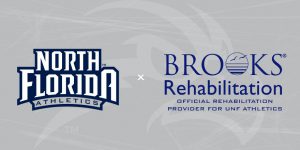Researchers Examine How Beliefs About Spinal Manipulation Affect Treatment Outcomes for Low Back Pain

Back to physical health resource hub
A study led by researchers from Brooks Rehabilitation and the University of Florida College of Public Health & Health Professions (UF PHHP) is looking at how patients and physical therapists think and feel about spinal manipulation, a common treatment for low back pain.
What is spinal manipulation
Spinal manipulation is a hands-on technique used by physical therapists. It involves applying controlled force to the spine to help reduce pain and improve movement. This treatment is a common and recommended intervention used by most physical therapists to treat people with low back pain.
However, spinal manipulation doesn’t always work the same for every patient. Brooks and UF researchers are hoping to better understand if perspectives of both the patient and physical therapist towards the treatment play a role in its effectiveness or positive outcome for the patient. Perceptions of spinal manipulation among physical therapists and patients are currently not clearly understood, which is one of the primary reasons this study is being conducted.
Why this study matters
The question the researchers want to answer is: “if the patient and therapist share similar beliefs—or at least understand each other’s views—will it lead to better care and better results?”
The goal of the study is to see if the beliefs of patients and therapists are related to patient clinical outcomes, such as pain and function.
For example:
- If a patient believes spinal manipulation will help and the therapist feels the same, the patient might feel more hopeful and motivated.
- But if their beliefs don’t match, it could lead to confusion, less trust or a weaker connection.
“We’re not just studying the treatment itself—we’re studying what people and clinicians believe about the treatment and how these beliefs may be similar or different based on specific clinical scenarios,” said Dr. Jason Beneciuk, clinical research scientist of the Brooks-UF PHHP Research Collaboration and director of Musculoskeletal Pain Research Program at Brooks. “That could potentially make a big difference in how patients respond to this particular treatment.”
By learning more about this, physical therapists may be able to give more personalized and effective care in the future.
Personalized care is more than just treating the pain
The study also looks at the bigger picture focusing on factors such as trust, communication and patient comfort. These all fall under the umbrella of contextual factors, and they might matter just as much as the actual treatment.
“This research could help us better train physical therapists to think not just about what they do, but how they do it—and how they connect with their patients,” said Sara Cristello, PT, DPT, OCS, FAAOMPT, director of Brooks Institute of Higher Learning.
The study is happening now in Brooks Rehabilitation’s outpatient clinics and will include people with different backgrounds and experiences.
The researchers hope the results will help make care more effective, more personal, and better for everyone.
Meet the research team conducting the study
This study is being led by a team of expert researchers and clinicians in pain rehabilitation, including:
- Jason Beneciuk, PT, DPT, PhD, MPH, Brooks Rehabilitation and the University of Florida College of Public Health and Health Professions Research Collaboration
- Joel E. Bialosky, PT, PhD, FAAOMPT, Brooks Rehabilitation and the University of Florida College of Public Health and Health Professions Research Collaboration
- Jill R. Hayes, PT, DPT, OCS, COMT, University of Florida College of Public Health and Health Professions
- Katherine E. Buzzanca-Fried, BA, BS, PhD, Brooks Rehabilitation and the University of Florida College of Public Health and Health Professions Research Collaboration
- Sara Cristello, PT, DPT, OCS, FAAOMPT, Brooks Rehabilitation
- Trent Harrison, PT, DPT, OCS, FAAOMPT, Brooks Rehabilitation
- Ryan Vickers, PT, DPT, OCS, FAAOMPT, Brooks Rehabilitation


